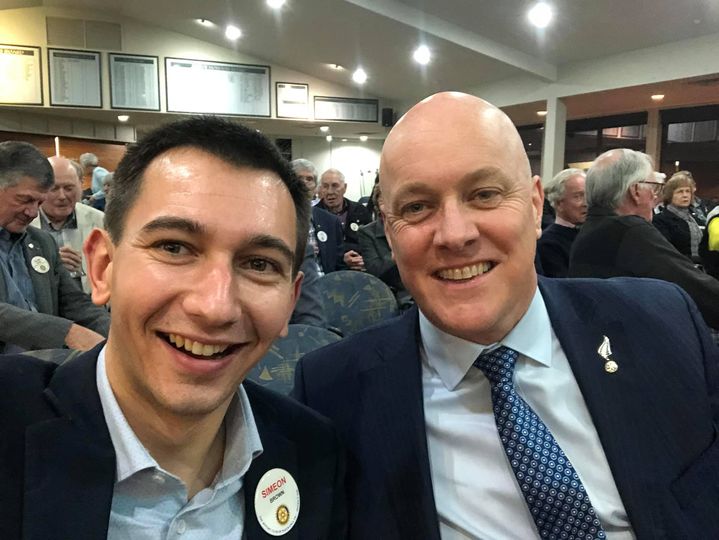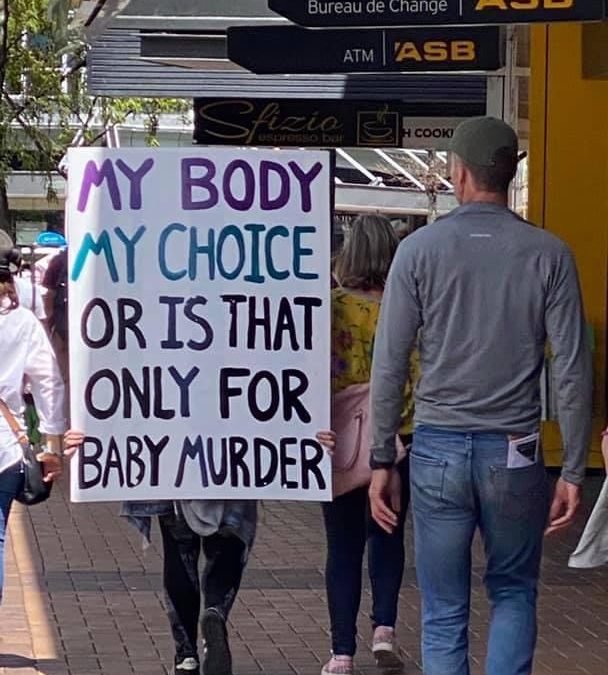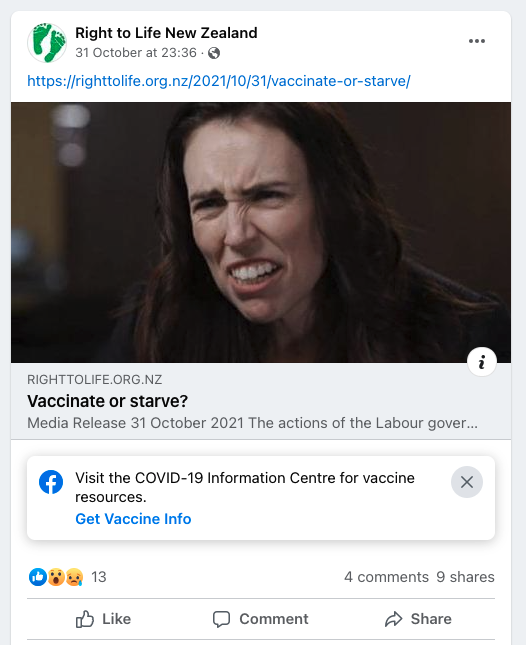
by admin | 15 Jun, 2023 | Our Blog
Image from Simeon Brown on Facebook. National Party leader Christopher Luxon (R) and MP for Pakuranga Simeon Brown (L) are both anti-choice.
By Alma De Anda, Abortion Rights Aotearoa Co-Treasurer
On 18 March 2022, a law was passed in Aotearoa to allow for the creation of ‘safe areas’ around abortion service providers to protect staff and patients from intimidation from anti-choice protestors. (This is following the removal of safe areas from the initial Bill decriminalising abortion in 2020, thanks to the ACT party.) Yet, as I type this, there have been NO safe areas established around any abortion provider in the entire country due to the unnecessarily arduous process to implement one. Former ALRANZ (Abortion Rights Aotearoa) President Terry Bellamak wrote about this in March. Three months later and there is still no progress.
The safe areas amendment passed because the government acknowledged abortion care is healthcare and should be treated as such. Despite this approach, implementing safe areas has proved to be an arduous process. This means anti-choice, anti-abortion extremists can still get together to harass anyone (patients or staff) entering or exiting abortion care facilities. We use the word ‘extremists’ in this context because it is extreme and dangerous to believe that a government or any one person has a right to force someone to stay pregnant against their will.
ALRANZ receives messages from concerned citizens wondering why people are still harassing abortion seekers and abortion providers if it’s unlawful. We must reply and explain the tedious and ridiculously long process that leaves providers and patients exposed to violence and harassment each day after an abortion provider’s application is received. A hopeful time estimate for the completion of the process is at least six to nine months.
If this glacial progress is what we have under a pro-choice government, one wonders what it would be like under one lacking the political will to implement abortion law reform. If a National or a National/ACT government win the next election, we could see the advancement of abortion access and abortion equity across Aotearoa die from purposeful procedural stagnation.
Abortion rights do not exist in a silo, and ALRANZ knows people have a wide range of beliefs about God and religion. ALRANZ has no issue with religious freedom, what we are concerned with is the Christian nationalism seeping its way into politics in Aotearoa. We know several key members of the National Party are actively and vocally opposed to abortion rights, as well as other human rights related to sexuality, race, and gender.
Party leader and MP for Botany Christopher Luxon is anti-choice and believes abortion is tantamount to murder. That implicitly means Luxon believes that one in four women in Aotearoa are murderers. Similarly, Tāmaki MP Simon O’Connor was overjoyed at the overturning of Roe v Wade, which ended the constitutional protection for abortion in the United States. O’Connor is also a fan of appearing on podcasts and YouTube channels to talk about the “annoying” topics of race and gender. (I won’t link to those, but if you want to look for them yourselves, you will find them. I do not recommend it though.) MP for Pakuranga Simeon Brown was “holding back tears” at the thought of abortion law reform and, as demonstrated when he voted “no” alongside seven of his National colleagues at the third reading of the Bill banning conversion therapy, thinks it is OK to tell LGBTQIA+ youth that his God does not approve of their ‘lifestyle’. Likewise, Northland-based MP Dr Shane Reti has personal views in direct conflict with abortion and LGBTQIA+ rights allegedly because of his Catholic faith. Reti would become the Minister for Health under a National government. How would he, or any of these other high-profile National MPs, advance or even conserve abortion rights in Aotearoa?
The short answer: they won’t. The National Party might not undo abortion law reform like what is happening in the United States. However, as the safe areas stagnation demonstrates the government does not have to introduce specific legislation to stifle abortion access. All they have to do is drag their feet on any aspect around abortion service delivery and they can still say, “See, we did not touch abortion law reform.”
And they would be correct, but they would not do what 74 per cent of New Zealanders want regarding abortion – to properly implement choice for all.
by admin | 19 Mar, 2023 | Media Release
Last Saturday 18 March, Aotearoa New Zealand marked the first anniversary of the passage of the Contraception, Sterilisation, and Abortion (Safe Areas) Amendment Act 2022. ALRANZ Abortion Rights Aotearoa notes that in spite of the act, New Zealand has no safe areas.
The process to create a safe area is cumbersome and time-consuming. It requires months of work by the Ministry of Health to plot out the safe area and get it approved. After all that, the fate of a safe area is in the hands of Cabinet, which can move it forward or ignore it.
There are currently about a dozen safe area applications in the pipeline. Half are ready for Cabinet to consider.
People who receive or provide abortion care need safe areas yesterday. Every day, people have to walk by judgemental anti-abortion protesters with huge, misleading, gory signs in order to access safe, legal health care.
ALRANZ president Dr Tracy Morison said, “Parliament passed the Safe Areas Bill because they saw the need for it. If there’s a need, and there definitely is, then the process for creating safe areas isn’t fit for purpose because not one safe area has been created to date.”
ALRANZ believes Cabinet needs to approve the safe areas applications as a matter of urgency, or admit the government got it wrong when they set out the requirements for creating safe areas.
by admin | 15 Feb, 2022 | Media Release
ALRANZ Abortion Rights Aotearoa welcomes the passing of the Contraception, Sterilisation, and Abortion (Safe Areas) Amendment Bill 2020 at its second reading this morning. The strong cross-party support for the bill is particularly pleasing, with a 108-12 result in favour of passage.
Whilst ALRANZ supports the creation of safe areas, we acknowledge the Bill in its current form is not perfect. ALRANZ Executive Member Jacqueline Cavanagh said, “the proposed process for the establishment of safe areas is cumbersome and will cause undue delays”.
“ALRANZ intends to advocate for safe area restrictions applying to all premises where abortion healthcare is provided immediately from assent. It is unconscionable for consumers and providers of abortion healthcare to be exposed to potential harm due to unnecessary red tape.”
ALRANZ would also like to remind the 12 MPs that voted against the second reading of this Bill that they are not voting on whether they support safe and legal abortion. The issue is whether abortion patients and providers should be protected from intimidation and the real threat of violence, not dissimilar from the threats those MPs have seen outside Parliament this week.
We urge these 12 MPs to reconsider their position and vote yes on the Bill in it’s the third reading. The passage of the Bill will demonstrate that Aotearoa is willing to protect consumers and providers of vital healthcare services.
ALRANZ Executive Member Jacqueline Cavanagh

by admin | 19 Nov, 2021 | Our Blog
By Ella Shepherd
On Tuesday, Kieran McAnulty (MP for the Wairarapa) shared his story about encounters with the anti-vax movement of Aotearoa. While speaking to his Wairarapa electorate, Kieran described being verbally assaulted and receiving numerous death threats, all while being filmed by his anti-vax assailant. This was a vile incident that rightly caused Kieran to fear for his safety.
Kieran spoke to Parliamentary Security about extending measures to protect MPs, such as installing security systems in MPs’ residences in both Wellington and their electorates. Such an assault on an MP is nerve-racking. Kieran noted that the mood changed pretty quickly, creating a volatile situation. Other MPs, such as Chris Bishop, have also described receiving “pretty abusive” messages. Likewise, David Seymour said MPs are becoming aware “we have to watch our back” because of heated interactions with constituents. Across Parliament there is consensus: threats of violence from anti-vaxxers are starting to escalate. Of course, this is awful. Anti-vaxxers take hard-line positions, are unwilling to compromise, and cross boundaries to reinforce their point. These confrontations are scary, and MPs are right to worry about their safety. As Kieran noted, situations can escalate quickly and create dangerous environments.
There is a parallel between anti-vax protesters targeting MPs and anti-abortion protestors targeting those accessing and providing abortion healthcare. First, the groups have considerable overlap in membership. Recent protests at Parliament came with signs that were both anti-abortion and anti-vax. As we can see in the photo above, many in the anti-vax movement are also anti-abortion. Furthermore, some of the key anti-abortion groups whose supporters regularly target abortion clinics also take an anti-vax stance. For example, Right to Life New Zealand’s Facebook page now posts a mix of anti-abortion and anti-vax rhetoric, such as this post from the 31st of October (below).
These aggressive and threatening tactics are not new – abortion providers and patients have long been targeted by these groups. It’s just that now MPs are also experiencing a taste. More MPs are being confronted with people getting up in their face while they are minding their business. With people filming them and uploading footage online to encourage others to join in on the threatening behaviour. With being called a murderer.
For MPs to now recognise that these behaviours are frightening is to finally accept what pregnant people and abortion providers have been saying for decades. After meeting with Parliament Security earlier this week, Kieran stated that all MPs would now be granted access to a security
upgrade, rather than having to ask for one. Meanwhile, pregnant people and abortion providers are still advocating for the Safe Areas Amendment Bill to be passed. Put simply, it would be hypocritical in the extreme for an MP to vote against abortion providers and patients getting protection from the same sort of harassment that MPs are able to protect themselves from, promptly and without hoop jumping.
While MPs can now access upgraded security, abortion providers and patients still have to go through a lengthy process. Not only are they waiting for the Bill to be passed, but once it is passed protection isn’t even ensured. Providers will still have to wait for the Minister of Health to consult with the Minister of Justice, and then recommend the establishment of a safe area. This is lengthy, discretionary, and does not accord with the reality of harassment outside abortion centres.
MPs and Parliament more broadly are aware that these people threaten the safety of others by pushing their anti-vax ideology onto unwilling citizens. MPs are able to push for greater protection for themselves in the face of these assaults. What are they doing to also protect abortion providers and patients? How are they ensuring safe areas are established in a timely and effective manner? Relatively privileged MPs are now feeling the heat, but ordinary people and healthcare workers are well and truly scalded.




